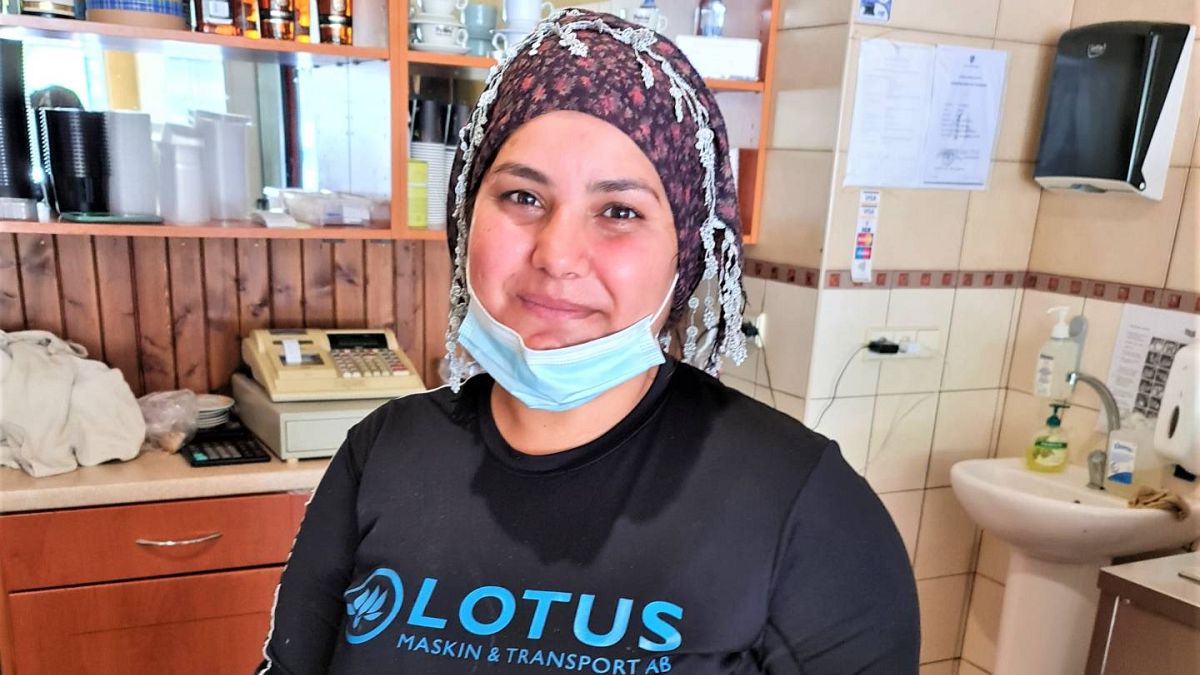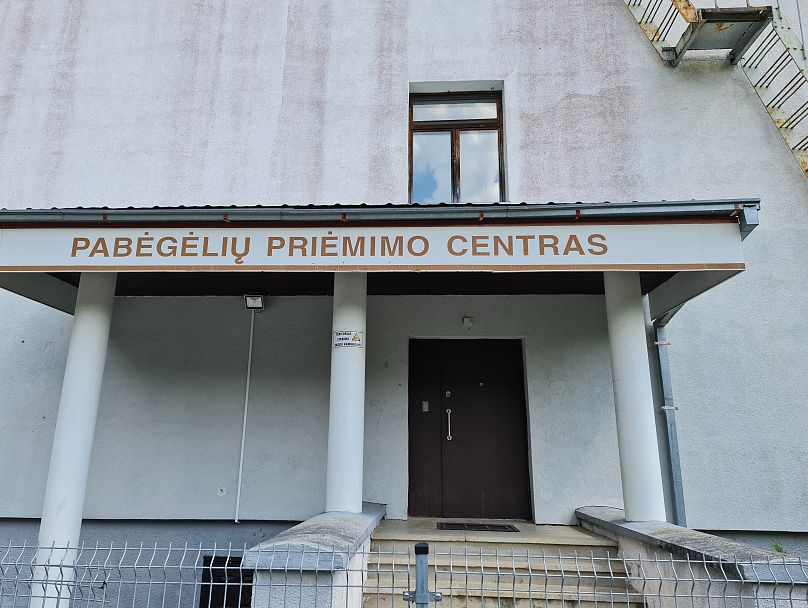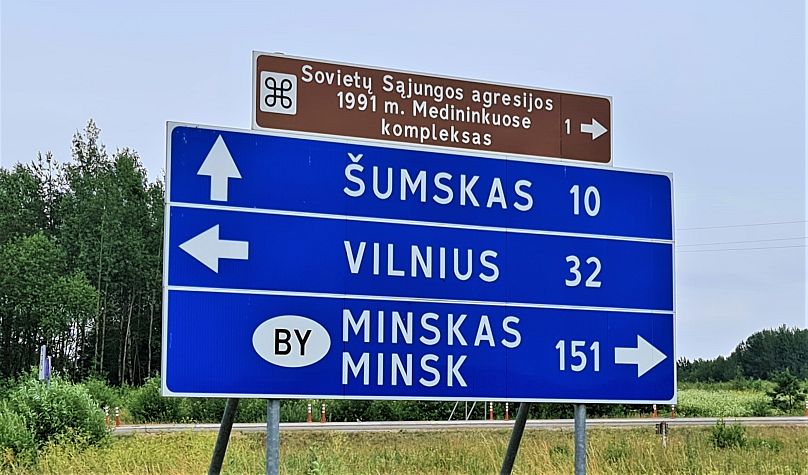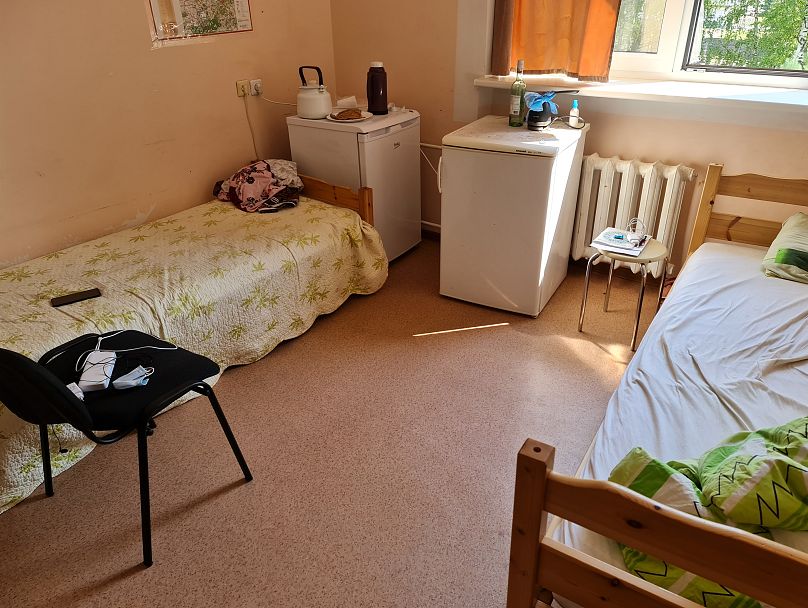“They come here for a better life. As a Christian, I believe we should help them,” said resident Kazimir Mikulevic.
In a small cafe next to the grocery store in Rukla, central Lithuania, Basma is serving cold beetroot soup, a regional summer staple, and greeting patrons in perfect, barely-accented Lithuanian.
A Syrian, Basma came to Lithuania four years ago with her husband, who works in a local sewing shop, fleeing Syria’s brutal civil war with her three children, aged 15, 12 and three.
They are one of only a handful of Syrian families in this tiny village of 2,000 people. And for them, Rukla is home.
“We came in as refugees,” Basma told Euronews, “but we have no intentions of moving from here, whatsoever.
"We are happy to live here in Rukla. Lithuania has granted us political asylum and we want to pay it back with our hard work.”
Rukla is at the forefront of Lithuania’s new migrant crisis, which has seen thousands of people crossing from Belarus in recent weeks and posed a challenge to the country’s centre-right government, which is fearful of rising anti-migrant sentiment among its restive voters.
Lithuanian officials are convinced that Belarusian authorities are involved in deliberate migrant smuggling in response to the country’s sheltering of dissidents and perceived support for the growing opposition movement against the government of autocrat Aleksander Lukashenko.
Lithuania has started building a wire fence near Lithuania's southern city of Druskininkai to manage the inflow of illegal migrants entering the country from Belarus. A total of 512 migrants have been detained in Druskininkai so far this year.
Rustamas Liubajevas, the commander of the State Border Guard Service (VSAT), has said that the barbed-wire barrier, the so-called concertina, would not be finished for several months.
Rukla, in Lithuania’s Jonava district, is home to a Refugee Reception Centre that has seen its numbers explode in recent weeks. There have never been so many refugees there as now.
Beatrice Bernotiene, who runs the centre, said on July 7 that it had received 131 refugees in the previous ten days. Total numbers at the RRC, where refugees live as their asylum claims are processed, have risen from 70 residents in mid-June to 214.
“The numbers tend to change every single day now,” she said.
“We may be compelled to add more cots into the rooms to accommodate all refugees.”
The surge in numbers could be devastating to the prospects of Lithuania’s main ruling party, the Lithuanian Homeland Union–Lithuanian Christian Democrats (HU-LCD), analysts say.
“Let’s be frank: Lithuanians do not want refugees. This is obvious. Politically, the ruling Conservatives can pay a very heavy price for the crisis it’s dealing with, especially if it drags on indefinitely,” Vytautas Dumbliauskas, associate professor at Mykolas Romeris University, said.
'We need to chase them out of here'
In Medininkai, a town around 130 kilometres from Rukla, people were divided on the new uptick in arrivals. Regina, a resident, said that she did not feel safe since dozens of mostly-Iraqi refugees and migrants arrived and were detained in a local border guard’s barracks.
“We need to chase them out of here. We do not need them here. We have two locks now to feel safer,” she said.
But Kazimir Mikulevic, another resident, felt Lithuania ought to show “more heart” to migrants.
“They come here for a better life. As a Christian, I believe we should help them,” he said.
As well as Iraqis, who often fly to Belarus and then cross the country’s 700-kilometre border to claim asylum, it is a diverse range of nationalities that have arrived in Lithuania during 2021 so far. For many, said Bernotiene in Rukla, Lithuania is not their ultimate destination.
“Some of the people (in the centre) had never heard about Lithuania before ending up here. I have a gut feeling they have been deliberately sent to Lithuania via the border,” she said.
“For most, Lithuania is not the country number one on their wish list.”
The Rukla Centre provides temporary accommodation for vulnerable and underage refugees, especially for families with children. The majority are Iraqis and the centre has seen an upswing in undocumented refugees recently, Bernotiene said, that claim to be teenagers.
“Many of them look older than teenagers – to me at least,” she said.
But there has also been a surge in African refugees, most of whom have travelled from countries as far away as Congo, Cameroon, Togo and Mali.
The breadth of different nationalities is a new development, she said: “Before we would count representatives of the nations on the fingers of one hand. Those days are long gone.”
Before coming to the centre, the migrants were detained at the Belarusian-Lithuanian border and it is clear that some of the Congolese asylum seekers have been in Belarus or Russia for some time, often speaking some Russian as well as English.
Underage migrants can stay at the centre until they reach adolescence, and are assigned to rooms depending on their familial status and religion. Legal assistance is provided by Lithuanian NGOs but the length of time it takes to process asylum claims means that many remain in the centre indefinitely. They are allowed to leave for 48 hours, but not to leave the country.
It employs a handful of social workers and helpers, and a psychologist, Karolina Siauciunaite.
“One of the most common issues that refugees have are anxieties stemming from traumatic experiences and uncertainty,” Siauciunaite said.
“Many have a proclivity to depression and experience a strong sense of fear – all of which lead to demotivation.”
Men tend to be reluctant to seek psychological help, as are Muslim women, she said.
The centre also employs a language teacher, Loreta Kazlauskiene, to help the residents learn Lithuanian. Many find the process very difficult, she said.
“Our Lithuanian course lasts 96 hours, which is thought to be enough to have a breakthrough,” she said.
Most of the residents of the centre were reluctant to speak to Euronews, but a young Uyghur refugee said he had fled China due to the brutal crackdown by Beijing on his community. He had just received asylum and was planning his new life in the capital, Vilnius.
“By profession, I am a barber and I know how to cook,” he said.
“I hope the skills will help me get my life started here on the right foot.”
Sasha, from war-ravaged Nagorno-Karabakh, said that he had reached Belarus first and then sneaked into Lithuania on a truck. He spent two months in a Lithuanian prison before being sent first to a centre in Pabrade and then to Rukla.
Before he left Nagorno-Karabakh, he saw his father and sister handcuffed and dragged from their home.
“I am now awaiting the local migration authorities‘ decision on my asylum request. I want to live in Lithuania – I really like it here,“ Sasha said.
Bozena Zaborovska-Zdanovic, advisor to Lithuania's minister of the interior, said that from January 1 to July 7, 1,416 migrants crossed the border illegally. By comparison, 81 migrants were detained at the border in 2020, 46 in 2019, 104 in 2018 and 72 in 2017.
Of that number this year, 615 were Iraqis, 196 were Congolese, 110 Cameroonians, 80 from Guinea, 57 from Iran, and other countries. The authorities could not always verify nationalities because migrants destroyed or had lost their documents.
A total of 747 requests for political asylum have been received in the year to July 7, and 63 have so far been approved. Those numbers stood at 321 and 80 in 2020, 646 and 79 in 2019 and 423 and 136 in 2018.
Crackdown
Lithuanian Foreign Minister Gabrielius Landsbergis visited the Turkish and Iraqi capitals on July 13 for talks on curbing flows of illegal migrants and returning them to their countries of origin.
The Lithuanian government has declared a state-level emergency situation due to the growing influx of irregular migration via Belarus.
Unhappy about the swell in migrant numbers, the Lithuanian parliament on July 13 passed law amendments allowing the detention of migrants for up to six months and limiting their rights.
Some, however, were quick to maintain that the adopted amendments to the Law on the Legal Status of Aliens pave way for the mass detention of asylum seekers.
Some 84 members of the 141-seat Parliament voted on July 13 to pass the law, brushing aside protests from the Red Cross and other nongovernmental organisations saying it violates Lithuania's international obligations and migrants' rights.
But is it Lithuanians that need protection from migrants, or the other way around?
“When it comes to Rukla, it is the refugees, not the community that should have more concerns about the safety perhaps,” said Bernotiene, head of the Rukla centre.
“There are some uneducated, prejudice-ridden people out there, every single incendiary remark on the social media (about refugees) can possibly trigger unrest.”
Every weekday, Uncovering Europe brings you a European story that goes beyond the headlines. Download the Euronews app to get a daily alert for this and other breaking news notifications. It's available on Apple and Android devices.



